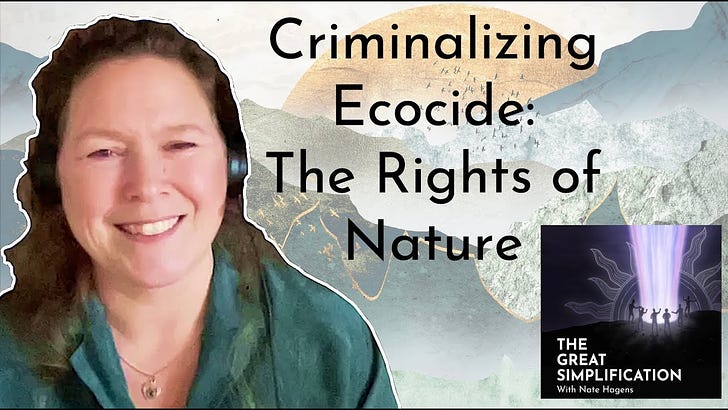Today, I’m re-joined by Swedish ecologist Pella Thiel, who was previously on a Reality Roundtable discussing Food and Community, to provide an overview of the legal frameworks behind the Ecocide and Rights of Nature Movements. Our current economic and legal systems have no mechanisms to consider nature in our decision making - much less to make systemic planetary stability a priority. Could redefining the destruction of our biosphere to be considered a crime parallel with that of genocide alter the way we structure laws governing our societies and economies?
Pella Thiel is a maverick ecologist, part-time farmer, full-time activist and teacher in ecopsychology. She is the co-founder of Swedish hubs of international networks like Swedish Transition Network and End Ecocide Sweden and a knowledge expert in the UN Harmony with Nature programme. Pella was awarded the Swedish Martin Luther King Award in 2023 and the Environmental Hero of the year 2019.
How are countries legislating and enforcing these ideas - even going so far as to act against the flow of the superorganism? Most importantly, how could top-down legal ideas such as these interact with bottom-up individual action to create powerful shifts in cultural values and motivations?
In case you missed it…
Last week, I released a Frankly reflecting on 7 thought experiments geared towards imagining scenarios and outcomes for ourselves, society, and the planet. While not rooted in reality, thinking through hypotheticals can be a valuable way to reflect on our ethics, ideals, and future decision points - and they can be fun to come up with. From the perceived quick-fix of solar panels to magic solutions for infrastructure and governance, how might human cultural values impact outcomes for the biosphere? How do humans and the climate shape each other, and what does that mean for the less stable climate we’re headed towards? If they knew the situation today, could humans from hundreds of years ago have avoided the carbon pulse - and what opportunities and responsibilities do we have today, living in the future's past?
If you appreciate The Great Simplification podcast…
Be sure to leave a review on your preferred podcast platform! Leaving reviews helps the podcast grow, which helps spread awareness of our systemic situation from experts in ecology, energy, policy, economics, technology, and community building so that we can better understand - and respond to - the challenges of the coming decade.
The Great Simplification podcast is produced by The Institute for the Study of Energy and Our Future (ISEOF), a 501(c)(3) organization. We want to keep all content completely free to view globally and without ads. If you’d like to support ISEOF and it’s content via donation, please use the link below.






I know that many have already listened and commented at the youtube site. Pella reaches to the heart of us ... We abandoned the non-human world where we belong. They of that world would see us back.
I was fortunate to have become a friend, however briefly, of Polly Higgens while she was doing the scoping work before she focussed specifically on the legal term 'Ecocide'. She and her husband Ian as lawyers understood the power of the law. I was again extremely lucky to have a last few words with her after she had become immersed in the global work, shortly before the diagnosis that cut short so much.
It is great encouragement to hear Pella so eloquently carrying that work forward.
Some poetic lines come to mind ... 'There came a wind like a bugle ... ' from the Collected Poems of Emily Dickinson.
Thank you Philip for those kind words! It is an honour to be walking in Pollys steps.